Praise for General of the Army
A stirring narrative that traces Marshalls career under ten presidents. Publishers Weekly
Crays biography is must reading. John Lehman, The Wall Street Journal, former Secretary of the Navy
Rich and readable, without being overwhelming, this portrait is a model of biographical excellence. Digby Diehl, Playboy
[This] readable and authoritative biography helps bring Marshall and his career into sharper focus.... Cray is adroit and sensitive. He commands his facts and explains ever-changing backgrounds and circumstances without slowing the narrative. The New Yorker
[A] solid, well-researched, and readable biography that goes well beyond Marshalls familiar role as Army Chief of Staff and architect of the European Recovery Program. Crays book is also valuable as a survey of a large chunk of twentieth-century history. The New York Times
An accurate and judicious, as well as a highly readable, portrait of a true American giant.... Crays tightly knit narrative is especially good in explaining the complex politico-military issues of the war years while keeping his subject in the foreground. Mark A. Stoler, The Los Angeles Times Book Review, author of George C. Marshall: Soldier-Statesman of the American Century
General of the Army captures the essence of Marshalls character and leadership style while placing in perspective his role in shaping American history during World War II and the Cold War. The Chicago Tribune
A concise but comprehensive biography that does evenhanded justice to a great man and his achievements. First rate. Kirkus Reviews
[Cray] turns a bright and sympathetic light on a soldier whom many authorities rank as the greatest commander of World War II. The Houston Chronicle
Well written, balanced, and effective.... Cray works his way skillfully through the intricate issues of wartime strategy.The Washington Post
[An] outstanding, detailed biography of the most praised American soldier/statesman of this century. Foreign Affairs
[A] superbly researched, elegantly written, sympathetic and insightful study. The Miami Herald
Cray gives us a fully fleshed-out portrait.... This book will stand the test of time and will be permanently included into the World War II bookshelf.... This is a consummate biography, and a must read for World War II buffs. The West Coast Review of Books
Cray has written an honest as well as a useful book and is candid about Marshalls lapses of judgment.... [A] well-rounded and highly satisfying biography that meets a longstanding need.The New Leader
[The authors] particular strength lies in his narrative power. The book flows exceptionally well.... Perhaps most impressive is Crays judicious treatment of the various historical controversies involving Marshall: Pearl Harbor, the strategy of the second front, Trumans firing of MacArthur, McCarthyism. Cray handles each episode with sensitivity and skill. Reviews in American History
GENERAL
OF THE ARMY
George C. Marshall
Soldier and Statesman
ED CRAY

First Cooper Square Press edition 2000
This Cooper Square Press paperback edition of General of the Army is an unabridged republication of the edition first published in New York in 1990, with addition of one textual emendation. It is reprinted by arrangement with the author.
Copyright 1990 by Ed Cray
All rights reserved.
No part of this book may be reproduced in any form or by any electronic or mechanical means, including information storage and retrieval systems, without written permission from the publisher, except by a reviewer who may quote passages in a review.
Book design by Tere LoPrete.
Published by Cooper Square Press,
An Imprint of the Rowman & Littlefield Publishing Group
150 Fifth Avenue, Suite 911
New York, New York 10011
Distributed by National Book Network
The hardcover edition of this book was catalogued as follows by the Library of Congress:
Cray, Ed.
General of the Army George C. Marshall, soldier and statesman / by Ed Cray.1st ed.
p. cm.
Includes index.
1. Marshall, George C. (George Catlett), 18801959. 2. GeneralsUnited StatesBiography. 3. United States. ArmyBiography. 4. StatesmenUnited StatesBiography. I. Title.
E745.M37C73 1990
973.918'092dc20
ISBN 978-0-8154-1042-3
 The paper used in this publication meets the minimum requirements of American National Standard for Information SciencesPermanence of Paper for Printed Library Materials, ANSI/NISO Z39.481992. Manufactured in the United States of America.
The paper used in this publication meets the minimum requirements of American National Standard for Information SciencesPermanence of Paper for Printed Library Materials, ANSI/NISO Z39.481992. Manufactured in the United States of America.
For Diane,
Finally
ACKNOWLEDGMENTS
We gratefully acknowledge permission from the Oral History Research Office, Columbia University, to print extracts from the oral histories of Harvey H. Bundy, Lucius DeBignon Clay, Dwight D. Eisenhower, Anthony C. McAuliffe, Walter S. Robertson, and James T. Williams, Jr.; and from Yale University Library to print portions of the Henry L. Stimson Diaries contained in the Henry L. Stimson Papers, Manuscripts and Archives, Yale University Library.
CONTENTS
Photographs appear following
FOREWORD
This was surely a time of giants, of men who shaped the most momentous period of the twentieth century, the years of the first truly global war, from 1931 to 1945. Roosevelt, Churchill, and Stalin, these men who massed armies, who inspired entire peoples to profound sacrifice, had but one peer, one man admitted to their councils on equal terms: General George Catlett Marshall, chief of staff of the United States Army.
Marshallthat civilized warrior, in Peter Wydens apt phrasestood amongst the titans for good reason. It was he who forged the overall strategy that was to win the war, then by force of character persuaded president and prime minister to adopt that conception. Churchill once wondered if perhaps he [Marshall] was the greatest Roman of them all, high praise from that accomplished historian. At another time the close-guarded Marshal Stalin saw in the aloof American characteristics that compelled Stalin to insist, I would trust General Marshall with my life.
As chief of staff, Marshall was to create and train a massive army, the largest his country has ever fielded, promoting younger officers, his men, to progressively higher command and vast responsibility. It was Marshall who incidentally set Dwight David Eisenhower on the path to the presidency.
Denied field command, the one prize he most wanted, Marshall was nonetheless admired by those who fought the battles. One of the most celebrated of American generals during the war, Matthew Ridgway, wrote, The combat soldier never had a better and more understanding friend than George C. Marshall. With the burdens of a global war upon his shoulders, he never forgot the man with the rifle, the man whose task it was to kill and be killed.
On leaving Washington for the last time, that craggy veteran of seven administrations, Secretary of War Henry L. Stimson, said to Marshall, I have seen a great many soldiers in my lifetime and you, sir, are the finest soldier I have ever known.
Yet there would be even more years of duty. The war over, and at an age when most men slip gratefully into retirement, Marshall took up a new career as a diplomat, serving a new president with the same dedication that had marked his years as a soldier. Marshall did much to shape the postwar world, seeking to moderate a Cold War even as he implemented policies and programs still in effect four decades later. Oddly, yet fitting too, it is as a diplomat, and not as a soldier, that he seems fated to be remembered best. Marshall, I believe, would have appreciated thatthough he was singularly uninterested in personal honors throughout his life. No battlefield victory so exemplified the American spirit as did the generosity of the postwar Marshall Plan.
Next page

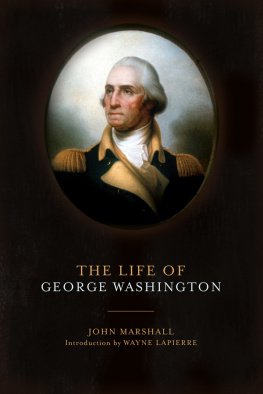
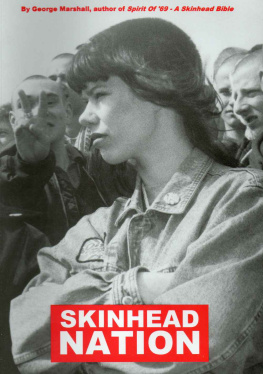
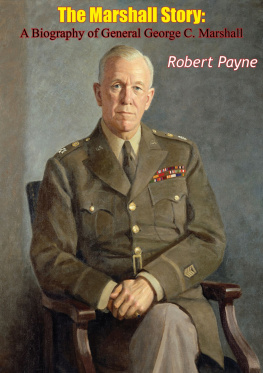
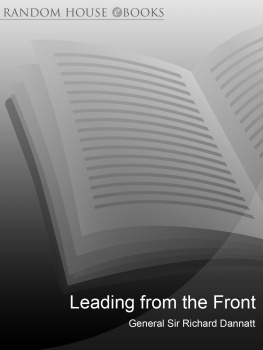
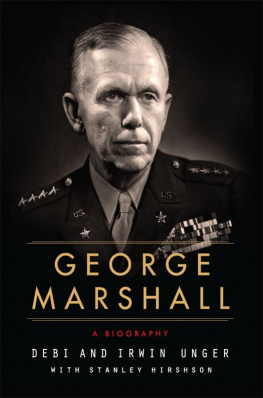
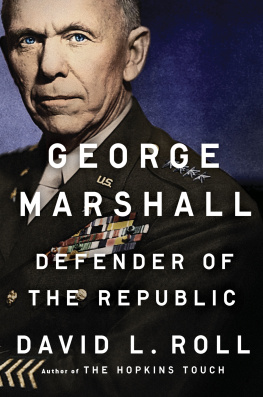
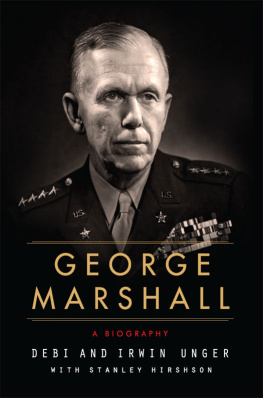
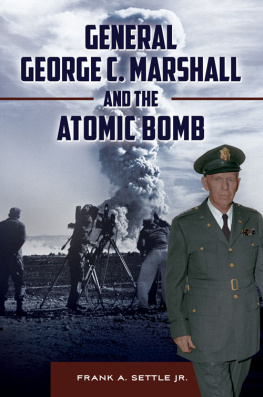

 The paper used in this publication meets the minimum requirements of American National Standard for Information SciencesPermanence of Paper for Printed Library Materials, ANSI/NISO Z39.481992. Manufactured in the United States of America.
The paper used in this publication meets the minimum requirements of American National Standard for Information SciencesPermanence of Paper for Printed Library Materials, ANSI/NISO Z39.481992. Manufactured in the United States of America.